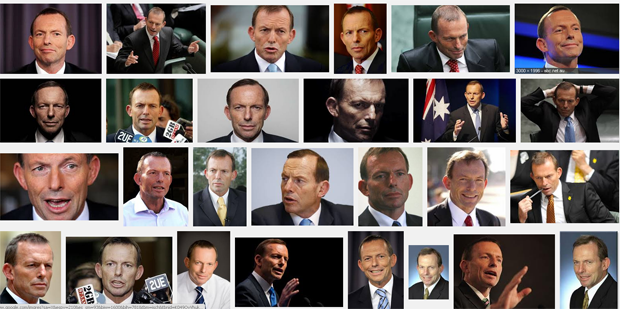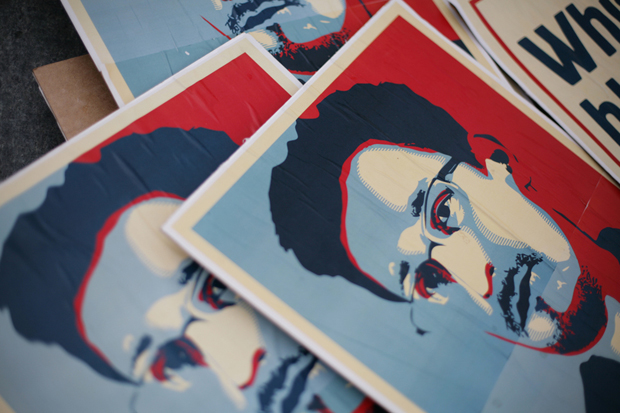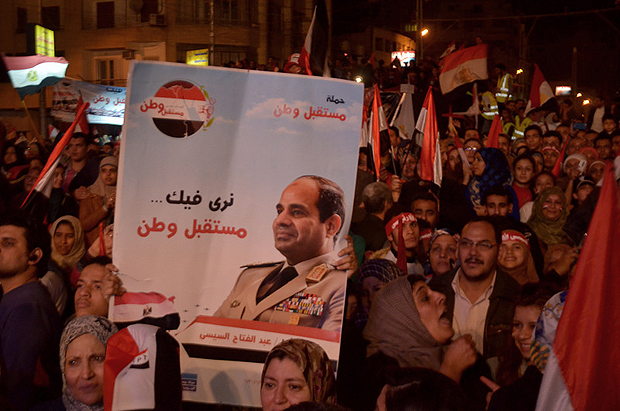Index relies entirely on the support of donors and readers to do its work.
Help us keep amplifying censored voices today.

Australian prime minister Tony Abbott
In weeks where Prime Minister Tony Abbott of Australia has publicly praised the importance of freedom of speech in relation to the repeal of a section of the Racial Discrimination Act (18C) it might seem strange that civil servants caught criticising the government, or PM, can be sanctioned for illicit social media use. But to look at the two and suggest it implies gross, implicit hypocrisy, as some have, is not the most nuanced interpretation; however, the new policy code, which actually only applies to one government department bears looking at.
The new guidelines, Social Media Policy of the Department of the Prime Minister and Cabinet, outline what can and cannot be done on social media by employees and seem at pains to cover all bases while also being remarkably intrusive compared with other similar government documents.
The guidelines state they are aimed at ensuring the public believes in the impartiality of those in the Department of the PM&C. They govern social media use, including anonymous comments, during office hours and outside of work, on private devices. What has been noted by the media however is that anonymous speech may be sanctioned and employees are requested to “dob” — that is, report — on colleagues if they see them contravening the new policy. Staff can be reported for being “critical or highly critical of the Department, the Minister or the Prime Minister’’ or “so harsh or extreme in their criticism of the government, government policies, a member of parliament from another political party, or their respective policies, that they could raise questions about the employee’s capacity to work professionally, efficiently or impartially”.
Despite the leaked document now available online, the department maintains, according to the Canberra Times, that its policy on public social media use is a strictly internal document and will not comment. The department also states that no person should speak directly with the media but rather refer all queries to the media department, where the scribe can address queries in writing. This bureaucratic attempt at transparency or a “timely response” is neither limited to this department or government. Under the previous Labor government certain departments, such as the Department of Immigration and Citizenship, took much the same stance at times. Of course, now even refugee or boat arrival numbers are kept secret and weekly press conferences have been scrapped.
The policy has been defended by Freedom Commissioner Tim Wilson, who also defends the repeal of 18C in the name of freedom of speech. He told the Canberra Times: “As I read it, the current policy allows public servants to be critical of government policy, but requires that they do so in a way that does not compromise their capacity, or perception, that they will exercise their role as a public servant in an impartial way.” Wilson believes in the civilising power of codes of conduct and that such “voluntary” agreements do not undermine essential freedom of speech.
The document has rather broad-ranging edicts which could be open to interpretation. It is understood people may “participate robustly” in debate, but robustness may not trump impartiality or professionalism. It is useful then that Abbott’s daughter does not now work for the prime minister’s department. After publicly calling him a “lame, gay, churchy loser” in 2009 her impartiality could be questionable.
This article was published on April 16, 2014 at indexoncensorship.org

(Photo: David von Blohn / Demotix)
Edward Snowden’s revelations on the voracious appetite of spying on all and sundry by the National Security Agency and allied agencies should not give pause for too much comment, other than to affirm a general premise: Activists and non-government groups are to be feared. Non-profits are seen as potential threats, though what to is sometimes unclear. Any government worth its salt should be afraid of its citizens – the latter must make the former accountable; the former must hold to the contractual bargain with citizens.
Last week, Snowden revealed to members of the Council of Europe via videolink from Moscow that such groups as Human Rights Watch and Amnesty International were high on the list of surveillance targets. “The NSA has specifically targeted either leaders or staff members in a number of civil and non-governmental organisations… including domestically within the borders of the United States.” He also delved further into such data mining programs as XKeyscore, a technology representing “the most significant new threat to civil liberties in modern times.” Analysts, using the program, can select the metadata of an individual, and find content, “without judicial approval or prior review.”
Dinah PoKempner, general counsel at Human Rights Watch, responded that, if true, it was “indicative of the overreach that US law allows to security agencies.” Such conduct “would again show why the US needs to overhaul its system of indiscriminate surveillance.” Indeed, it would fly in the face of a long held, if somewhat erroneous belief, that the US State Department actually treasures its human rights defenders, seeing them as the vanguard of reform rather than a cabal of troublesome dissent. Human rights defenders in allied countries, for instance, pose a different set of problems.
A cursory glance at the guidelines of the US State Department on supporting human rights reveals how, “Protecting and supporting human rights defenders is a key priority of US foreign policy…. The Department’s objective is to enable human rights defenders to promote and defend human rights without hindrance or undue restriction and free from fear of retribution against them or their families.” Stirring stuff. There is even a reference to US support for the UN Declaration on Human Rights Defenders, adopted by consensus of the General Assembly in 1998. Various strategies and techniques of encouragement are then discussed.
The guidelines even set out who human rights defenders are – those who “working alone or in groups, who non-violently advocate for the promotion and protection of universally recognised human rights and fundamental freedoms.”
Evidently, these guidelines did not quite cross the tables of those involved in the surveillance complex. This may well be partly due to bureaucratic bungling – the irresistible growth of the espionage complex, but it may just as well be seen as consistent: after all, the NSA watches, and the State Department disposes. The two occasionally seem to meet in fumbling circumstances.
The NSA is far from the only organisation engaged in the business of spying on activist groups and NGOs. A November 2013 report by Centre for Corporate Policy, a Washington, D.C. think tank, titled Spooky Business: Corporate Espionage Against Nonprofit Organizations, shows that such a process is addictive and systematic across centres of power. Aversion to dissent is endemic, and it attracts birds of a feather in both government and corporate circles. According to the report, the precondition for such espionage is that the non-profit organisation in question “impairs or at least threatens a company’s assets or image sufficiently.” The targets are varied, including “environmental, antiwar, public interest, consumer, food safety, pesticide reform, nursing home reform, gun control, social justice, animal rights and arms control groups.”
The report looks at the antics of numerous entities hungry for data on their threatening quarry. It might be the Society of Toxicology and Information Associates against animal rights activists. It might be Stratfor and Coca-Cola against People for the Ethical Treatment of Animals. Or BAE against Campaign Against the Arms Trade.
The gold target here seems to be Greenpeace, object of keen interest by the private security firm Beckett Brown International (BBI), retained by Dow Chemical, the world’s largest chlorine producer. The world’s largest operator of nuclear power plants, Électricité de France, has also hired a set of private intelligence firms to keep an eye on the activities of the organisation, be it through good old hacking or conventional spying. In November 2011, EDF was actually fined €1.5 million for “industrial espionage”, and two of its executives jailed.
Activities include infiltration, cultivation, deception. Trash bins are searched. Offices are cased, phone records of activists collected, confidential meetings breached. Names are blackened; the severity of disasters – environmental, notably – are minimised. According to Russell Corn, the managing director of Diligence, a corporate intelligence agency, anywhere up to 25 per cent of an activist camp will be “taking the corporate shilling” (New Statesman, Aug 7, 2008). An inflated figure, perhaps, but worth keeping in mind.
Such behaviour illustrates all too well that there is a conflict of an international, global dimension between established centres of corporate and government power against those who would reform, or at the very least challenge, them. When convenient, corporate and government interests will collude and find accord. There is even an argument to be made that their functions and interests have become, at points, indistinguishable.
Nothing illustrates this better than the privatisation phenomenon of intelligence activities, where traditional espionage is outsourced and redeployed with contracting agencies and their employees. The private investigative firm Hackluyt, retained by BP and Shell, has a direct line to MI6. Some irony, then, that Snowden was working for one such agency when he acquired his invaluable treasure trove of surveillance activities.
This article was posted on 16 April 2014 at indexoncensorship.org
We asked the public in which decade they felt women had the strongest roles in cinema? After a close battle for the top spot, the votes have been counted and… the 1950s is victorious!
The multi-Oscar winning movie All About Eve fought off stiff competition from films spanning six decades, edging out Annie Hall (1970s) and Working Girl (1980s) at the last minute to claim the title.
A rare chance to see this female tour-de-force on the big screen followed by a lively discussion with Index on Censorship Editor Rachael Jolley, Rich Mix CEO Jane Earl, co-founder of Underwire festival Gabriella Apicella and LA-based actress Olivia J Fox.
When: Sunday 27th April, 12:00 noon
Where: Rich Mix Cinema and Arts Centre, E1 6LA
Tickets: Book your tickets here.

Egyptian demonstrators chanting for the army and police and raising flags and banners bearing images of General Abdel Fattah al-Sisi. But since the military-backed removal of Mohamed Morsi in summer 2013, academic freedom has been further corroded. (Image: Adham Khorshed/Demotix)
Since the military-backed overthrow of Mohamed Morsi’s government last summer, censorship of journalism in post-revolutionary Egypt has become an urgent concern of human rights and freedom of expression organisations. A quieter and more gradual undercurrent to the question of censorship, however, has been the continued corrosion of academic freedom of expression in post-revolutionary Egypt.
Under Hosni Mubarak’s regime, academic freedom within Egypt was notoriously limited, not least by the fact that since 1994, deans and presidents of public universities were appointed by the state, and professional career progress in academia frequently depended on compliance with the state line. Political activism was prohibited on campus and police units were stationed inside universities to “maintain order”. However, the dramatic increase of Egyptians in higher education in the last fifteen years of the Mubarak era – without the improvement of either higher education facilities or graduate employment prospects – is widely held to have been a central factor in the popular uprising that overthrew the regime in 2011.
Activist academics played a pivotal role in the 2011 revolution. In particular, the March 9 movement, founded in 2004, acted as a complement to the more clandestine student activist April 6 movement, and was comprised of politicised professors and academic administrators who were focused on protesting the impingement of academic life by the state.
As such, the post-Mubarak era was heralded by many as new “window“ for academic freedom in Egypt and “an opportunity to revive the Egyptian universities’ founding ideals as autonomous institutions seeking knowledge for knowledge’s sake.” Like freedom of the press, however, none of the “stages” of the post-revolutionary period have allowed this to come to fruition. Under the immediate, post-revolutionary, interim SCAF period, and under Morsi’s short-lived presidency, university reform was never substantively addressed, whilst activism on campuses splintered along the increasingly polarised lines of post-revolutionary political discourse. Moreover, many of the student activists of the 2011 uprisings were concerned at the possibility of Islamist encroachment on academic freedom of expression, and the policing of secular and female students’ activities at universities.
Since the military-backed removal of Morsi in summer 2013, and the mass violence that accompanied it, academic freedom has been further corroded both by the discourse and strategies of the new ruling powers on the one hand, and by the return of university premises as physical sites of political violence. The return of state security to campuses has been met with resistance from student activists and those who see it as a return to Mubarak-era surveillance of the university space. This has, however, been framed as a necessary step to prevent further violence as that witnessed since late 2013, which saw intense clashes at Al-Azhar University and an engineering student shot dead on the Cairo University campus.
Alongside the physical space of the university, the discipline of academic practice has been significantly impinged by the increasingly fractious and polarised political situation. Like journalists, academics have been caught in the political cross-fire of the post-July 2013 government’s campaign against the Muslim Brotherhood, who the government declared a terrorist organisation in December. Over the summer, two Canadian academics were detained for nearly two months despite no independent proof that they had engaged with the Muslim Brotherhood or taken part in “terrorist activities”.
As Ursula Lindsey has noted in The New York Times, political scientists working on the subject of contemporary Egyptian politics have faced particular difficulties. The 2011 revolution is itself now the subject of academic study, yet its protracted aftermath impedes research, and academics such as Nathan J Brown, a leading scholar on Egypt’s constitutions and judiciary, have noted that foreign academics are now cautious against travelling to Egypt for research. The military-backed government that overthrew Morsi has engaged in both a physical clampdown and a war of narratives with the Muslim Brotherhood, quick to frame all association with the Islamist organisation as collusion.
This presents particular problems for academics who wish to conduct interviews for the purpose of academic research. After all, this time last year, Morsi’s Muslim Brotherhood-backed regime was the official government, and, as such, academic researchers would likely have had contact with the group — not out of political allegiance but in order to conduct their studies. Yet such “contact” can now find scholars isolated, silenced, or even accused of “espionage”, as in the case of Professor Eman el-Din Shahin. Professor Shahin’s colleagues have spoken out in his defence, arguing that he is a well-respected and thorough researcher whose contact with political enemies of the new regime would have been in his legitimate capacity as a researcher. Such a climate is naturally conducive to self-censorship on the part of other academics, a loss for all of us who wish to understand and engage with contemporary Egypt. As an academic, you may not be politicised, but the state is very interested in politicising you.
The March 9 movement, formed in the Mubarak era by scholars seeking freedom of academic expression, marked its anniversary last month in sombre circumstances — these new challenges for academic freedoms overlay the continuing, unresolved issues of the pre-2011 period, from workplace nepotism to underfunding in public education. The uprisings of 2011 were ignited in part by the March 9 movement’s campaign for academic freedom of expression, yet in the various incarnations of the post-revolutionary order, this dream is still far from being realised.
This article was posted on 15 April 2014 at indexoncensorship.org